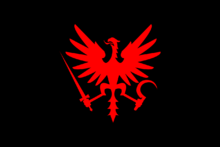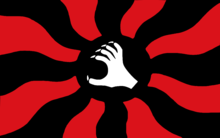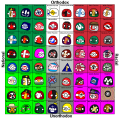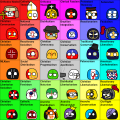{{Ideology
|themecolor = #000000
|textcolor = #FF0000
|title = ![]() National Syndicalism
|image = CercleProudhon.png
|caption = “The sense of our idea is this: Destroying the principle that founded the modern economy, that imposed on nations the capitalist regime and subordinated all human values to the value of gold; to found a new economy which will be a national economy and which will judge all the institutions which grow from the economy in keeping with the guarantees they assure French blood.”
|aliases =
National Syndicalism
|image = CercleProudhon.png
|caption = “The sense of our idea is this: Destroying the principle that founded the modern economy, that imposed on nations the capitalist regime and subordinated all human values to the value of gold; to found a new economy which will be a national economy and which will judge all the institutions which grow from the economy in keeping with the guarantees they assure French blood.”
|aliases = ![]() Cercle Proudhon
Cercle Proudhon
![]() Spanish Proto-Fascism
Spanish Proto-Fascism
![]() Fascist Syndicalism
Fascist Syndicalism ![]()
Religious Syndicalism
![]() Right-Syndicalism
Right-Syndicalism
![]() Gamer Syndicalism
Gamer Syndicalism
![]() Fascist Mutualism
Fascist Mutualism
![]() Jonsism (In
Jonsism (In ![]() Spain)
Spain)
![]() Totalism (By
Totalism (By ![]() HOI4 KR community)
|alignments =
HOI4 KR community)
|alignments = ![]() AuthLeft
AuthLeft
![]() Culturally Right
Culturally Right
![]() Religious (Usually)
Religious (Usually)
![]() Syndicalists
Syndicalists
![]() Socialists
Socialists
![]() Third Positionists
Third Positionists
![]() Nationalists
Nationalists
![]() Quasi-Fascists
Quasi-Fascists
(Accused)
|variants =
|regional=
![]() Cuban Revolutionary Party – Authentic
Cuban Revolutionary Party – Authentic
![]() Portuguese National Syndicalism
Portuguese National Syndicalism
![]() Robert E. Ley/Nazi Syndicalism
Robert E. Ley/Nazi Syndicalism
 Anti-Capitalism
Anti-Capitalism Anti-Americanism
Anti-Americanism Anti-Marxism
Anti-Marxism Anti-Masonry
Anti-Masonry Anti-Semitism
Anti-Semitism Fascism
Fascism Nazism
Nazism European Nationalism
European Nationalism Positive Christianity
Positive Christianity Corporatism
Corporatism Strasserism (Early on)
Strasserism (Early on)
|influences = ![]() Anti-Capitalism
Anti-Capitalism
![]() Anti-Democracy
Anti-Democracy
![]() Anti-Liberalism
Anti-Liberalism
![]() Corporatism
Corporatism
![]() Integral Nationalism
Integral Nationalism
![]() Mutualism
Mutualism
![]() Revolutionary Syndicalism
Revolutionary Syndicalism
![]() Sorelianism
Sorelianism
|influenced =
![]() British Fascism
British Fascism
![]() Falangism
Falangism
![]() Fascism
Fascism
![]() Integral Nationalism
Integral Nationalism
![]() Monarcho-Syndicalism
Monarcho-Syndicalism
![]() Tarrantism
Tarrantism
 Charles Maurras (1868-1952),
Charles Maurras (1868-1952),  France
France Alceste De Ambris (1874-1934)
Alceste De Ambris (1874-1934)  Kingdom of Italy
Kingdom of Italy Édouard Berth (1875-1939),
Édouard Berth (1875-1939),  France
France Georges Valois (1878-1945),
Georges Valois (1878-1945),  France
France Robert E. Ley (1890-1945)
Robert E. Ley (1890-1945)  Germany
Germany Francisco Rolão Preto (1893-1977),
Francisco Rolão Preto (1893-1977),  Portugal
Portugal Jacques Arthuys (1894-1943),
Jacques Arthuys (1894-1943),  France
France José Antonio Primo de Rivera (1903-1936),
José Antonio Primo de Rivera (1903-1936),  Second Spanish Republic
Second Spanish Republic Ramiro Ledesma Ramos (1905-1936),
Ramiro Ledesma Ramos (1905-1936),  Second Spanish Republic
Second Spanish Republic Onésimo Redondo (1905-1936),
Onésimo Redondo (1905-1936),  Second Spanish Republic
Second Spanish Republic Pedro Durruti (1911-1937),
Pedro Durruti (1911-1937),  Second Spanish Republic
Second Spanish Republic Vyacheslav Klykov (1939-2006)
Vyacheslav Klykov (1939-2006)  Russia
Russia
 Ramón Grau (1881-1969),
Ramón Grau (1881-1969),  Cuba
Cuba Nimio de Anquín (1896-1979)
Nimio de Anquín (1896-1979)  Argentina
Argentina Osvaldo Lira (1904-1996),
Osvaldo Lira (1904-1996),  Chile
Chile Julio Meinvielle (1905-1973),
Julio Meinvielle (1905-1973),  Argentina
Argentina Jorge Luna Yépes (1909-1989),
Jorge Luna Yépes (1909-1989),  Ecuador
Ecuador Salvador Abascal (1910-2000),
Salvador Abascal (1910-2000),  Mexico
Mexico Óscar Únzaga (1916-1959)
Óscar Únzaga (1916-1959) Misael Galleguillos (1940-),
Misael Galleguillos (1940-),  Chile
Chile
 Georges Sorel (1847),
Georges Sorel (1847),  France
France William Z. Foster (1881),
William Z. Foster (1881),  Combined Syndicates of America
Combined Syndicates of America Benito Mussolini (1883),
Benito Mussolini (1883),  Italian Socialist Republic
Italian Socialist Republic Earl Russell Browder (1891),
Earl Russell Browder (1891),  United Socialist Federation of America
United Socialist Federation of America Oswald Mosley (1892),
Oswald Mosley (1892),  Union of Britain
Union of Britain Dai Li (1897),
Dai Li (1897),  Republic of China
Republic of China
|likes=![]() Unions
Unions
Striking
![]() Myth
Myth
![]() Tradition
|dislikes=Being called a fake Syndicalist or a Leftist
Tradition
|dislikes=Being called a fake Syndicalist or a Leftist
![]() Liberals
Liberals
![]() Anti-Unionists
Anti-Unionists
![]() Materialism
Materialism
![]() Rationalism
|song = "Himno del combate" ([[File:JONS.png jonsism)
Rationalism
|song = "Himno del combate" ([[File:JONS.png jonsism)
"Himno de las JONS de Valladolid" ([[File:JONS.png jonsism)
}}
National Syndicalism is an ![]() economically left,
economically left, ![]() nationalist,
nationalist, ![]() authoritarian and
authoritarian and ![]() culturally right ideology. It emerged from the tendency of revolutionary syndicalists to ally with integral nationalists. It opposes
culturally right ideology. It emerged from the tendency of revolutionary syndicalists to ally with integral nationalists. It opposes ![]() Capitalism,
Capitalism, ![]() liberal democracy and
liberal democracy and ![]() Secularism. The ideology is usually associated with either
Secularism. The ideology is usually associated with either ![]() Integralism or
Integralism or ![]() Fascism.
Fascism.
History
 Portuguese National Syndicalism
Portuguese National Syndicalism

![]() National Syndicalism in Portugal was characterized by the condemnation of the
National Syndicalism in Portugal was characterized by the condemnation of the ![]() totalitarianism present in
totalitarianism present in ![]() German and
German and ![]() Italian societies during the 1930s, its leader,
Italian societies during the 1930s, its leader,
![]() Francisco Rolão Preto, declared during a banquet that the
Francisco Rolão Preto, declared during a banquet that the ![]() National Syndicalist Movement was "beyond
National Syndicalist Movement was "beyond
![]() democracy,
democracy, ![]() fascism and
fascism and
![]() communism".
communism". ![]() The National Syndicalist Movement had a strong
The National Syndicalist Movement had a strong ![]() Catholic inspiration, with the
Catholic inspiration, with the ![]() Order of Christ Cross being their symbol, they were very popular among university students and young soldiers. It endorsed
Order of Christ Cross being their symbol, they were very popular among university students and young soldiers. It endorsed ![]() Catholic social teaching,
Catholic social teaching, ![]() Christian personalism,
Christian personalism, ![]() integralism,
integralism, ![]() municipalism and a restoration of the
municipalism and a restoration of the ![]() traditional monarchy and were opposed to
traditional monarchy and were opposed to ![]() communism and
communism and ![]() capitalism. Its members were also known as the Blueshirts, as they used blue shirts as uniforms.
capitalism. Its members were also known as the Blueshirts, as they used blue shirts as uniforms.
Its leader, ![]() Francisco Rolão Preto declared on an interview to the United Press that: "
Francisco Rolão Preto declared on an interview to the United Press that: "![]() fascism and
fascism and ![]() hitlerism are
hitlerism are ![]() totalitarian, divinizers of the State and
totalitarian, divinizers of the State and ![]() caesarists: we pretend to find in the
caesarists: we pretend to find in the ![]() Christian tradition of the
Christian tradition of the ![]() Portuguese people the formula that allows the harmonization of the sovereignty of the national interest with the moral dignity of free men."
Portuguese people the formula that allows the harmonization of the sovereignty of the national interest with the moral dignity of free men."
He criticized the ![]() Estado Novo for adopting a single-party system typical of
Estado Novo for adopting a single-party system typical of ![]() fascism, which he hated, due to this criticism, the
fascism, which he hated, due to this criticism, the ![]() national syndicalist journal 'Revolução!' was suspended on 24 July. On November of the same year, the
national syndicalist journal 'Revolução!' was suspended on 24 July. On November of the same year, the ![]() national syndicalists split, the majority decided to support
national syndicalists split, the majority decided to support ![]() Salazar and integrate the party with the
Salazar and integrate the party with the
![]() União Nacional, abandoning the principles of partisan independence defended by
União Nacional, abandoning the principles of partisan independence defended by ![]() Rolão Preto and
Rolão Preto and
![]() Alberto Monsaraz.
Alberto Monsaraz.
On 10 July 1934, ![]() Rolão Preto was arrested and subsequently exiled and on 29 July of the same year,
Rolão Preto was arrested and subsequently exiled and on 29 July of the same year, ![]() national syndicalism was forbidden by the
national syndicalism was forbidden by the ![]() salazarists.
salazarists.
 Spanish National Syndicalism
Spanish National Syndicalism
See Falangism
 Italian National Syndicalism
Italian National Syndicalism
In the early 20th century, ![]() nationalists and
nationalists and ![]() syndicalists were increasingly influencing each other in
syndicalists were increasingly influencing each other in ![]() Italy. From 1902 to 1910, a number of
Italy. From 1902 to 1910, a number of ![]() Italian
Italian ![]() revolutionary syndicalists including
revolutionary syndicalists including ![]() Arturo Labriola,
Arturo Labriola, ![]() Agostino Lanzillo,
Agostino Lanzillo, ![]() Angelo Oliviero Olivetti,
Angelo Oliviero Olivetti, ![]() Alceste De Ambris,
Alceste De Ambris, ![]() Filippo Corridoni and
Filippo Corridoni and ![]() Sergio Panunzio sought to unify the Italian
Sergio Panunzio sought to unify the Italian ![]() nationalist cause with the
nationalist cause with the ![]() syndicalist cause and had entered into contact with Italian nationalist figures such as
syndicalist cause and had entered into contact with Italian nationalist figures such as ![]() Enrico Corradini. These
Enrico Corradini. These ![]() Italian national syndicalists held a common set of principles: the rejection of
Italian national syndicalists held a common set of principles: the rejection of ![]() bourgeois values,
bourgeois values, ![]() democracy,
democracy, ![]() liberalism,
liberalism, ![]() marxism,
marxism, ![]() internationalism, and
internationalism, and ![]() pacifism while promoting heroism, vitalism, and violence. Not all
pacifism while promoting heroism, vitalism, and violence. Not all
![]() Italian revolutionary syndicalists joined the
Italian revolutionary syndicalists joined the ![]() fascist cause, but most
fascist cause, but most ![]() syndicalist leaders eventually embraced
syndicalist leaders eventually embraced ![]() nationalism and "were among the founders of the
nationalism and "were among the founders of the ![]() fascist movement," where "many even held key posts" in
fascist movement," where "many even held key posts" in ![]() Mussolini's regime.
Mussolini's regime. ![]() Benito Mussolini declared in 1909 that he had converted over to
Benito Mussolini declared in 1909 that he had converted over to ![]() revolutionary syndicalism by 1904 during a general strike.
revolutionary syndicalism by 1904 during a general strike.
![]() Enrico Corradini promoted a form of
Enrico Corradini promoted a form of ![]() national syndicalism that utilized
national syndicalism that utilized ![]() maurassian nationalism alongside the
maurassian nationalism alongside the ![]() syndicalism of Georges Sorel.
syndicalism of Georges Sorel. ![]() Corradini spoke of the need for a
Corradini spoke of the need for a ![]() national syndicalist movement that would be able to solve
national syndicalist movement that would be able to solve ![]() Italy's problems, led by
Italy's problems, led by ![]() elitist
elitist ![]() aristocrats and
aristocrats and ![]() anti-democrats who shared a
anti-democrats who shared a ![]() revolutionary syndicalist commitment to direct action through a willingness to fight.
revolutionary syndicalist commitment to direct action through a willingness to fight. ![]() Corradini spoke of
Corradini spoke of ![]() Italy as being a "proletarian nation" that needed to pursue
Italy as being a "proletarian nation" that needed to pursue ![]() imperialism in order to challenge the
imperialism in order to challenge the ![]() "plutocratic" nations of
"plutocratic" nations of ![]() France and the
France and the ![]() United Kingdom.
United Kingdom. ![]() Corradini's views were part of a wider set of perceptions within the right-wing
Corradini's views were part of a wider set of perceptions within the right-wing ![]() Italian Nationalist Association (ANI) that claimed that
Italian Nationalist Association (ANI) that claimed that ![]() Italy's economic backwardness was caused by corruption within its political class,
Italy's economic backwardness was caused by corruption within its political class, ![]() liberalism, and division caused by "ignoble socialism". The
liberalism, and division caused by "ignoble socialism". The ![]() ANI held ties and influence amongst
ANI held ties and influence amongst ![]() conservatives,
conservatives, ![]() Catholics, and the business community.
Catholics, and the business community.
A number of ![]() Italian fascist leaders began to relabel
Italian fascist leaders began to relabel ![]() national syndicalism as
national syndicalism as ![]() Fascist syndicalism.
Fascist syndicalism. ![]() Mussolini was one of the first to disseminate this
Mussolini was one of the first to disseminate this ![]() term, explaining that "
term, explaining that "![]() Fascist syndicalism is national and productivistic… in a national society in which labor becomes a joy, an object of pride and a title to nobility." By the time
Fascist syndicalism is national and productivistic… in a national society in which labor becomes a joy, an object of pride and a title to nobility." By the time ![]() Edmondo Rossoni became secretary-general of the
Edmondo Rossoni became secretary-general of the ![]() General Confederation of Fascist Syndical Corporations in December 1922, other
General Confederation of Fascist Syndical Corporations in December 1922, other ![]() Italian national syndicalists were adopting the "
Italian national syndicalists were adopting the "![]() Fascist syndicalism" phrase in their aim at "building and reorganizing political structures… through a synthesis of State and labor". An early leader in
Fascist syndicalism" phrase in their aim at "building and reorganizing political structures… through a synthesis of State and labor". An early leader in ![]() Italian trade unionism,
Italian trade unionism, ![]() Rossoni and other
Rossoni and other ![]() fascist syndicalists not only took the position of radical nationalism, but favored "class struggle". Seen at the time as "radical or leftist elements,"
fascist syndicalists not only took the position of radical nationalism, but favored "class struggle". Seen at the time as "radical or leftist elements," ![]() Rossoni and his
Rossoni and his ![]() syndicalist cadre had "served to some extent to protect the immediate economic interests of the workers and to preserve their class consciousness".
syndicalist cadre had "served to some extent to protect the immediate economic interests of the workers and to preserve their class consciousness". ![]() Rossoni was dismissed from his post in 1928, which could have been due to his powerful leadership position in the
Rossoni was dismissed from his post in 1928, which could have been due to his powerful leadership position in the ![]() Fascist unions, and his hostilities to the business community, occasionally referring to
Fascist unions, and his hostilities to the business community, occasionally referring to ![]() industrialists as "vampires" and "profiteers".
industrialists as "vampires" and "profiteers".
With the outbreak of World War I, ![]() Sergio Panunzio noted the national solidarity within
Sergio Panunzio noted the national solidarity within ![]() France and
France and ![]() Germany that suddenly arose in response to the war and claimed that should
Germany that suddenly arose in response to the war and claimed that should ![]() Italy enter the war, the
Italy enter the war, the ![]() Italian nation would become united and would emerge from the war as a new nation in a
Italian nation would become united and would emerge from the war as a new nation in a ![]() "Fascio nazionale" (national union) that would be led by an
"Fascio nazionale" (national union) that would be led by an ![]() aristocracy of warrior-producers that would unite
aristocracy of warrior-producers that would unite ![]() Italians of
Italians of ![]() all classes, factions, and regions into a disciplined socialism.
all classes, factions, and regions into a disciplined socialism.
In November 1918, Mussolini ![]() defined national syndicalism as a doctrine that
defined national syndicalism as a doctrine that ![]() would unite economic classes into a program of national development and growth.
would unite economic classes into a program of national development and growth.
Beliefs
WIP
How to Draw
Cercle Proudhon Eagle design

- Draw a ball.
- Fill the ball with black.
- Draw the Cercle Proudhon eagle in red.
- Draw the eyes and you're done!
| Color Name | HEX | RGB | |
|---|---|---|---|
| Black | #141414 | 20, 20, 20 | |
| Red | #FF0000 | 255, 0, 0 | |
Portuguese design

- Draw a ball
- Color it blue
- In the center, draw a white circle
- In the circle, draw a red outline of a cross
- Add the eyes and you're done
| Color Name | HEX | RGB | |
|---|---|---|---|
| Blue | #00309A | 0, 48, 154 | |
| White | #FFFFFF | 255, 255, 255 | |
| Red | #D72821 | 215, 40, 33 | |
JONS design

- Draw a ball
- Fill it black
- Draw 8 red spokes
- Draw a black circle in the middle
- Draw a white claw
- Add the eyes
| Color Name | HEX | RGB | |
|---|---|---|---|
| Black | #141414 | 20, 20, 20 | |
| Red | #DB0A13 | 219, 10, 19 | |
| White | #FFFFFF | 255, 255, 255 | |
Relations
Friends
 National Anarchism - Love ya bud, but please get a state.
National Anarchism - Love ya bud, but please get a state. Mutualism - I owe most of my inspiration to you!
Mutualism - I owe most of my inspiration to you! Wait, why are you looking at me weird? Falangism - My Spanish son.
Falangism - My Spanish son. British Fascism - My British incarnation.
British Fascism - My British incarnation. Yellow Socialism - Syndicalist and Nationalist? Based!
Yellow Socialism - Syndicalist and Nationalist? Based! Monarcho-Syndicalism - Tradition and Syndicalism? Mega Based!
Monarcho-Syndicalism - Tradition and Syndicalism? Mega Based! Integral Nationalism - My good old friend.
Integral Nationalism - My good old friend.
Frenemies
 Sorelianism - What do you mean you aren’t a nationalist and you oppose reactionaries? But you were a huge influence on most of us, especially Cercle Proudhon.
Sorelianism - What do you mean you aren’t a nationalist and you oppose reactionaries? But you were a huge influence on most of us, especially Cercle Proudhon. Welfare Chauvinism - Good direction by far, you are slowly getting there. But you have to reject completely the Free Market. At least SD had already embraced the 3rd position and works with trade unions.
Welfare Chauvinism - Good direction by far, you are slowly getting there. But you have to reject completely the Free Market. At least SD had already embraced the 3rd position and works with trade unions. Francoism - You abandoned national syndicalism for him!?
Francoism - You abandoned national syndicalism for him!? 
 Anarcho-Syndicalism - Degenerate anarchist progressive, but somewhat based economics. I wish the economics were a bit less left wing, though.
Anarcho-Syndicalism - Degenerate anarchist progressive, but somewhat based economics. I wish the economics were a bit less left wing, though. French Fascism - I thought he would follow my ideology but he betrayed France.
French Fascism - I thought he would follow my ideology but he betrayed France. Marxism–Leninism - You have some good ideas but I am not
Marxism–Leninism - You have some good ideas but I am not  Nazi.
Nazi. National Conservatism - Ayy, you get me pretty much! But be more economically left.
National Conservatism - Ayy, you get me pretty much! But be more economically left. National Bolshevism - Too much left-wing economically, syndicates should still have an important role in the national economy, but still overall decent.
National Bolshevism - Too much left-wing economically, syndicates should still have an important role in the national economy, but still overall decent. Can I join the GANG? Strasserism - A bit too Racialist socially, plus you're associated with
Strasserism - A bit too Racialist socially, plus you're associated with  Nazis, but you are still better than
Nazis, but you are still better than  them.
them. Marxism - I like the idea of class struggle but why so materialistic? Also a
Marxism - I like the idea of class struggle but why so materialistic? Also a  h*gelian.
h*gelian. Socialism - You taught me how to strike and I respect you for that, but please embrace nationalism.
Socialism - You taught me how to strike and I respect you for that, but please embrace nationalism. Fascism - You did a good job spreading my ideas but why the Hegelianism and Totalitarianism?
Fascism - You did a good job spreading my ideas but why the Hegelianism and Totalitarianism? Nazism- Same as above, and you put racialism over syndicalist ideals. But you and Mussolini were a good help for the Spanish National Syndicalists.
Nazism- Same as above, and you put racialism over syndicalist ideals. But you and Mussolini were a good help for the Spanish National Syndicalists.
Enemies
 Capitalism - Dehumanizing system!
Capitalism - Dehumanizing system! Neoliberalism - Your economic and social policies are revolting.
Neoliberalism - Your economic and social policies are revolting. Neoconservatism - Fake conservative, he leaves economic disasters wherever he goes.
Neoconservatism - Fake conservative, he leaves economic disasters wherever he goes. Progressivism - A tool to legitimize the rule of the bourgeoisie.
Progressivism - A tool to legitimize the rule of the bourgeoisie. Left Communism - Revisionism is fine cry about it.
Left Communism - Revisionism is fine cry about it. National Capitalism - You're not a nationalist. You are just a racialist capitalist.
National Capitalism - You're not a nationalist. You are just a racialist capitalist.
Further Information
Literature
Wikipedia
 National Syndicalism
National Syndicalism Cercle Proudhon
Cercle Proudhon National Syndicalists (Portugal)
National Syndicalists (Portugal) JONS (Spain)
JONS (Spain) Fascist syndicalism
Fascist syndicalism- Revolutionary National Syndicalist Movement
Gallery
-
Credit:
 TheLegend2T, Source
TheLegend2T, Source
-
Credit:
 Based And Jedpilled
Based And Jedpilled
-
Old Drawing for the Portuguese NatSynd ball
| | |
| Main Related Self-Inserts | |
| Main Definitions Application Related Other Ideologies Self-Inserts | |
Self-Inserts | |
| | |


